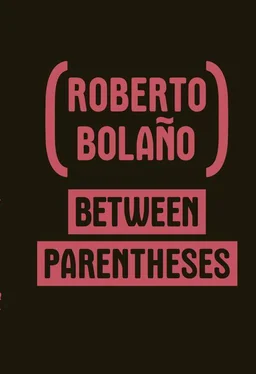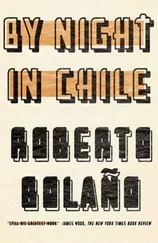Roberto Bolaño - Between Parentheses - Essays, Articles and Speeches, 1998-2003
Здесь есть возможность читать онлайн «Roberto Bolaño - Between Parentheses - Essays, Articles and Speeches, 1998-2003» весь текст электронной книги совершенно бесплатно (целиком полную версию без сокращений). В некоторых случаях можно слушать аудио, скачать через торрент в формате fb2 и присутствует краткое содержание. Год выпуска: 2011, Издательство: New Directions, Жанр: Публицистика, Критика, на английском языке. Описание произведения, (предисловие) а так же отзывы посетителей доступны на портале библиотеки ЛибКат.
- Название:Between Parentheses: Essays, Articles and Speeches, 1998-2003
- Автор:
- Издательство:New Directions
- Жанр:
- Год:2011
- ISBN:нет данных
- Рейтинг книги:4 / 5. Голосов: 1
-
Избранное:Добавить в избранное
- Отзывы:
-
Ваша оценка:
- 80
- 1
- 2
- 3
- 4
- 5
Between Parentheses: Essays, Articles and Speeches, 1998-2003: краткое содержание, описание и аннотация
Предлагаем к чтению аннотацию, описание, краткое содержание или предисловие (зависит от того, что написал сам автор книги «Between Parentheses: Essays, Articles and Speeches, 1998-2003»). Если вы не нашли необходимую информацию о книге — напишите в комментариях, мы постараемся отыскать её.
The Savage Detectives
Between Parenthese
Between Parentheses: Essays, Articles and Speeches, 1998-2003 — читать онлайн бесплатно полную книгу (весь текст) целиком
Ниже представлен текст книги, разбитый по страницам. Система сохранения места последней прочитанной страницы, позволяет с удобством читать онлайн бесплатно книгу «Between Parentheses: Essays, Articles and Speeches, 1998-2003», без необходимости каждый раз заново искать на чём Вы остановились. Поставьте закладку, и сможете в любой момент перейти на страницу, на которой закончили чтение.
Интервал:
Закладка:
There are three images of the real Dick that I’ll carry with me always, along with my memories of his countless books. First: Dick and all his wives — the incessant expense of California divorces. Second: Dick receiving a visit from the Black Panthers, an FBI car parked outside his house. Third: Dick and his sick son, and the voices Dick hears in his head advising him to go back to the doctor again to inquire about a different illness, very rare, very serious, which Dick does, and the doctors realize their mistake and they perform emergency surgery and save the boy’s life.
THE BOOK THAT SURVIVES
Although it may seem like a memory exercise, it isn’t. The first book I was given by the first girl I fell in love with and lived with was a book by Mircea Eliade. I still don’t know what she was trying to tell me. Somebody else, somebody less foolish, would have realized immediately that the relationship wouldn’t last and would’ve taken the proper steps to protect himself from suffering. I can’t remember the first book my mother gave me. I do vaguely recall a fat illustrated history, almost a comic book, though closer to Prince Valiant than Superman, about the War of the Pacific, that is, the war between Chile and the Peruvian-Bolivian alliance. If I remember right, the hero of the book — a kind of War and Peace of underdevelopment — was a volunteer who had enlisted in the Séptimo de la Línea, a famous infantry regiment. I’ll always be grateful to my mother for giving me that book instead of the children’s classic Papelucho . As for my father, I don’t remember him ever giving me a book, although occasionally we would pass a bookstore and at my request he would buy me a magazine with a long article in it on the French electric poets. All those books, including the magazine, along with many other books, were lost during my travels and moves, or else I let people borrow them and never saw them again, or I sold them or gave them away.
But there’s one book I’ll never forget. Not only do I remember when and where I was when I bought it, but also the time of day, the person waiting for me outside the bookstore, what I did that night, and the happiness (completely irrational) that I felt when I had it in my hands. It was the first book I bought in Europe and I still have it. It’s Borges’s Obra poetica , published by Alianza/Emecé in 1972 and long out of print. I bought it in Madrid in 1977 and, although Borges’s poetry wasn’t unfamiliar to me, I started to read it that night and didn’t stop until eight the next morning, as if there was nothing in the world worth reading except those poems, nothing else that could change the course of the wild life that I’d lived up until then, nothing else that could lead me to reflect (because Borges’s poetry possesses a natural intelligence and also bravery and despair — in other words, the only things that inspire reflection and that keep poetry alive).
Bloom maintains that it’s Pablo Neruda, more than any other poet, who carries on Whitman’s legacy. In Bloom’s opinion, however, Neruda’s effort to keep the Whitmanian tree growing and thriving ends in failure. I think that Bloom is wrong, as he so often is, even as on many other subjects he’s probably our continent’s best literary critic. It’s true that all American poets must — for better or for worse, sooner or later — face up to Whitman. Unfailingly, Neruda does so as the obedient son. Vallejo does so as the disobedient or prodigal son. Borges — and this is the source of his originality and his cool head — does so as a nephew, and not even a very close one, a nephew whose curiosity vacillates between the chilly interest of the entomologist and the stoical ardor of the lover. Nothing more alien to him than the quest to shock or to stir admiration. No one more indifferent to the vast masses of America on the march, although somewhere he wrote that what happens to one man happens to all men.
And yet Borges’s poetry is the most Whitmanian of all: Whitman’s themes are always present in his verse, as are their counterarguments and rebuttals, the reverse and the obverse of history, the heads and tails of the amalgam that is America and whose success or failure is yet to be decided. But that isn’t all he is, which is no small feat.
I began with my first love and with Mircea Eliade. She still lives in my memory; the Romanian has long since been banished to the purgatory of unsolved crimes. I end with Borges and with my gratitude and astonishment, though careful not to forget the lines of “Almost Final Judgment,” a poem that Borges hated: “I have said astonishment where others say only habit.”
BLOOD MERIDIAN
Blood Meridian is a Western, a cowboy novel by a writer who seems to specialize in the genre. Many enterprising types thought that Cormac McCarthy would never be translated into Spanish and they ransacked him shamelessly, abetted by ignorance and a rather curious understanding of intertextuality. And yet Blood Meridian, set in the mid-nineteenth century, isn’t just a Western but also a fevered, ultra-violent novel about life and death, with all kinds of underlying themes (nature as man’s great enemy, the absolute impossibility of redemption, life as inertia); a novel that, in part, tells the story of a group of Americans who launch a murderous raid into the state of Chihuahua and then, after crossing the Sierra Madres, into the neighboring state of Sonora, and whose mission, for which they’re well compensated by the governments of both states, is to hunt down and scalp Indians, which isn’t just difficult but also costly in time and lives, and so they end up massacring whole Mexican towns, where the scalps are ultimately similar enough that it makes no difference.
Blood Meridian is also a novel about place, about the landscape of Texas and Chihuahua and Sonora; a kind of anti-pastoral novel in which the landscape looms in its leading role, imposingly — truly the new world, silent and paradigmatic and hideous, with room for everything except human beings. It could be said that the landscape of Blood Meridian is a landscape out of de Sade, a thirsty and indifferent landscape ruled by strange laws involving pain and anesthesia, the laws by which time often manifests itself.
The other two characters in the novel, Judge Holden and a boy known only as the kid, are antagonists, though they belong to the same gang: the judge is a learned man and a child killer, a musician and a pederast, a naturalist and a gunslinger, a man who yearns to know everything and destroy everything. The kid, by contrast, is a survivor; he’s wild but he’s a human being or, in other words, a victim. According to the distinguished Harold Bloom, Blood Meridian is one of the best American novels of the twentieth century.
Cormac McCarthy was born in 1933 and his life has been rich in adventure and risk. Blood Meridian was first published in 1985. The edition reviewed here was published by Debate in 2001, in a translation by Luis Murillo Fort.
TROUBADOURS
What do the troubadours have to say to us today? What’s the source of their appeal, their excellence? I don’t know. I remember that I was inspired to read them by Pound, and especially by Martín de Riquer’s dazzling studies. From then on, little by little I began amassing books and anthologies in which there appeared the names of Arnaut Daniel, Marcabrú, Bertrán de Born, Peire Vidal, Giraut de Bornelh. By the nature of their trade, most were travelers and globetrotters. Some only traveled one or two provinces, but there were others who crossed Europe, fought as soldiers, sailed the Mediterranean, visited Muslim lands.
Carlos Alvar makes a distinction between troubadours, trouvères, and minnesingers. The real difference is geographic. The troubadours were mostly from southern France, Provençal, although some were Catalan too. The trouvères were from the north of France. The minnesingers were German. Time, which has yet to erase their names and some of their works, will finally erase these national differences.
Читать дальшеИнтервал:
Закладка:
Похожие книги на «Between Parentheses: Essays, Articles and Speeches, 1998-2003»
Представляем Вашему вниманию похожие книги на «Between Parentheses: Essays, Articles and Speeches, 1998-2003» списком для выбора. Мы отобрали схожую по названию и смыслу литературу в надежде предоставить читателям больше вариантов отыскать новые, интересные, ещё непрочитанные произведения.
Обсуждение, отзывы о книге «Between Parentheses: Essays, Articles and Speeches, 1998-2003» и просто собственные мнения читателей. Оставьте ваши комментарии, напишите, что Вы думаете о произведении, его смысле или главных героях. Укажите что конкретно понравилось, а что нет, и почему Вы так считаете.












